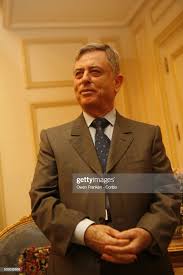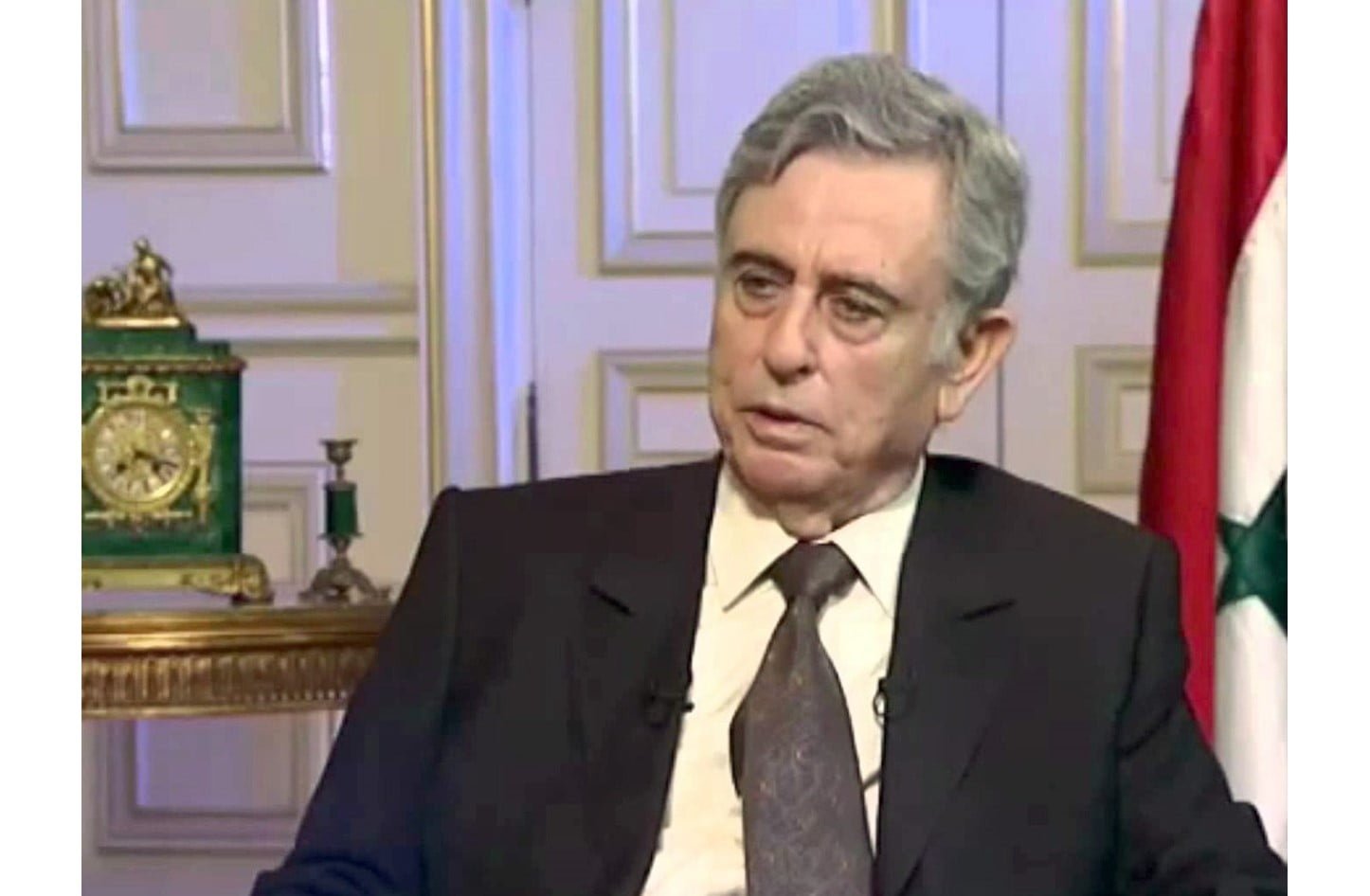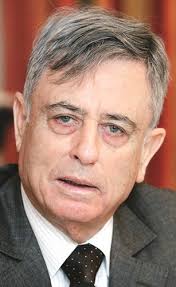There is no doubt that former Syrian Vice President Abdel Halim Khaddam played a prominent and pivotal role in the political life of Syria and Lebanon. He held various positions, including lawyer, governor, minister, and vice president of the republic. However, he defected from the Syrian regime and formed the National Salvation Front in opposition to it. During the Syrian military presence, Khaddam was responsible for the Lebanese file for several years.
In addition, Khaddam oversaw the transfer of the presidency to President Lahoud after the death of the late President Hafez Al-Assad. In an exclusive interview with the Beirut Observer website, Khaddam shared his perspective on the changes in Syria’s relations with the international community. He also discussed the Lebanese issue and expressed his opinion on the International Tribunal, as well as Hariri and Jumblatt’s visit to Syria. We present to you the key highlights of the interview:
Mr. Abdel Halim Khaddam, firstly, can you please inform us why you have been absent from the media scene recently and what is your perspective on the Syrian, Arab, and regional political situation?
The reason for my absence from the media is the suspension of Zanobia channel due to insufficient funding. Most Arab media outlets are under the control of their respective governments, which are generally unwelcoming towards opposition voices in any Arab country.
If change is to occur through the will of the people, the internal political situation in Syria is in a crisis marked by poverty, corruption, repression, and sectarian tensions. The regime’s alleged openness is merely a guise for escalating repression and persecution. On the regional front, the situation is complex and tense due to two major issues.
The first issue is the Arab-Israeli conflict, with the Palestinian cause at its core. As we can observe, the situation is further complicated by Israeli intransigence and its refusal to comply with United Nations resolutions. The United States is also pursuing a policy of encroachment on Palestinian territories through its settlement policy.
The second issue revolves around the tensions between Iran and the West, primarily driven by the nuclear dispute and Iran’s expanding influence in the region. The West perceives this as a threat to its interests and to Israel.
There are some who claim that the National Salvation Front, which you lead and is opposed to the Syrian regime, has become merely a source of press releases without achieving any tangible results in terms of revolutionary rhetoric and calls for regime overthrow. How would you respond to this criticism?
The National Salvation Front in Syria is one of the principal opposition forces operating clandestinely and under challenging security conditions. Its activities are focused on two fronts. Firstly, it aims to expand its circle of supporters. Secondly, it engages in distributing publications that expose the practices of the regime.
Did the split of the Muslim Brotherhood on April 4th deal a final blow to the Syrian opposition? Is it true that the split was caused by a campaign of defamation from certain unnamed factions within the front due to differing opinions on the recent Israeli attack on the Gaza Strip?
Undoubtedly, the split within the Muslim Brotherhood has had a negative impact. However, the claims of a campaign against the Muslim Brotherhood within the National Salvation Front are unfounded. All parties within the Front expressed condemnation of the Israeli aggression on Gaza. The main issue arose when the Muslim Brotherhood released a statement suspending their opposition to the regime in order to support Gaza, which not all other parties were convinced by. It could be true if the Syrian regime made a decision to participate in the confrontation to alleviate the bloody pressure on Gaza.
What is your comment on the explosion that occurred in the Sayeda Zeinab area in Damascus last Thursday, and the discrepancies between the Syrian and Iranian statements regarding the incident? Was it a deliberate act coinciding with the visit of Saeed Jalili, the Secretary General of the Supreme National Security Council and an official in the Iranian nuclear file, to Syria?
My information about the explosion is based on what was published in the media. However, what surprised and shocked many people was how the explosion of a bus wheel could cause such destruction to the facades of shops and houses, resulting in the loss of twelve lives. Body parts were scattered on the facades of houses and shops
What is your opinion on the Western countries’ newfound openness towards the Syrian regime and the change in the American attitude towards it?
The West is primarily concerned about Iran. These countries believe that if they separate the Syrian regime from Iran, it will weaken Iran, diminish the influence of Hezbollah, and isolate Hamas. This is why they have shown this openness, without considering the possibility of its success.
I believe that anyone who thinks it is possible to separate the Syrian regime from Iran is mistaken. The nature of their relationship makes it difficult to separate them. Additionally, abandoning Iran would mean abandoning Hezbollah and Hamas, which would result in losing the Lebanese and Palestinian cards and their ability to leverage these cards, which is dangerous for the Syrian regime. I believe this openness will be short-lived because the Syrian president is convinced that his policy of opposition and intransigence has given him leverage that motivates the West to engage with him.
Do you support Syrian-Israeli negotiations?
The National Salvation Front in Syria supports the Arab Peace Initiative. However, when it comes to Syrian-Israeli negotiations, there are no serious negotiations because neither party truly desires peace. Israel talks about negotiations to show the Palestinians that if they do not accept their terms, Israel is ready to reach an agreement with Syria. Similarly, Israel has no intention of withdrawing from the Golan Heights. The Syrian regime, on the other hand, knows it cannot bear the burden of the concessions that Israel demands.
Moreover, both sides prefer a state of “no peace, no war” as it allows Israel to continue its aggressive expansionist policies and maintain its presence in the occupied territories. It also keeps the Israelis in a state of tension. The Syrian regime uses this situation to justify the application of emergency law, which enables it to suppress the Syrian people through violence. Achieving peace would require ending the state of emergency, leading to significant developments in the country, which the regime wants to avoid.
What is your comment on the Hezbollah document? Can the new Lebanese government, led by Saad Hariri, effectively govern in light of Hezbollah’s refusal to disarm and its allegiance to the Iranian regime in its conflict with Israel?
Hezbollah’s document does not bring about any fundamental changes. It maintains its ideological connection with Iran and its adherence to Wilayat-e Faqih. Furthermore, it continues to retain its weapons, which have taken on a new role of defending Lebanon against the Israeli threat, effectively replacing the National Army. This approach indicates that the party intends to hold onto its weapons for an indefinite period. Consequently, Lebanon’s building and progress are hindered by this situation, as it involves two sources of authority: the state and the resistance.
At this stage, I anticipate that Hezbollah will demonstrate a positive approach in its dealings with the Lebanese government, particularly since the issue of its weapons has been overlooked. Nonetheless, this calmness and flexibility in their approach are more influenced by regional circumstances than internal conditions.
What is your response to the violent campaign initiated by the former Director General of Lebanese General Security, General Jamil Al-Sayed, which specifically targeted you along with other judges, politicians, and media professionals? Additionally, a criminal lawsuit has been filed against you and others for the offenses of criminal slander and false testimony in the case of the assassination of the late President Rafik Hariri, leading to a misleading investigation and unjust imprisonment for four years.
This campaign does not merit a response or comment.
Where is the International Tribunal for Lebanon in the investigation of President Hariri’s assassination, and why is there an attempt to politicize it to protect key individuals involved in the crime from facing punishment?
The International Tribunal for Lebanon cannot be subjected to politicization for two reasons. First, it was established through a resolution of the Security Council, and second, the international judges overseeing the tribunal are not susceptible to influences like some judges in our region. In recent statements made by Mr. Bellemare in Beirut, he emphasized that the purpose of his visit was to reassure the victims’ families that the court will remain impartial and that progress has been made in the investigation.
What is your perspective on Prime Minister Saad Hariri’s visit to Syria, and do you see it as an exoneration of the Syrian regime after it faced political accusations regarding President Hariri’s assassination? What are the expected outcomes of this visit?
The visit of Lebanese Prime Minister Saad Hariri to Syria is part of discussions on various issues, as stated by President Saad Hariri. He distinguishes between fraternal relations and the existing political differences. Former Prime Minister Fuad Siniora also visited Damascus shortly after assuming the presidency of the Lebanese government.
How do you describe the shift made by Walid Jumblatt, the President of the Democratic Meeting, as he turned against his allies within the March 14 forces and embraced the Syrian regime again after expressing regret for his opposition over the past four years?
Mr. Walid Jumblatt did not turn against his allies, but rather, he has a strategic approach in assessing the internal situation in Lebanon and the region, as well as the ongoing rivalry between himself and the Syrian regime. He is well aware of these dynamics and has deep calculations for the current phase. He believes that internal reconciliations can alleviate the burdens faced by the Lebanese people, especially given the uncertain regional and international conditions.
In a press interview with Buthaina Shaaban, the political advisor to the Syrian President, it was mentioned that Syria is waiting to approve Walid Jumblatt’s visit. The decision regarding his visit lies with the Syrian leadership. Why do you think there is such a long delay? Is there a condition that Jumblatt needs to fulfill before entering the Muhajreen Palace?
As I mentioned earlier, the opposition towards Mr. Walid Jumblatt from the Syrian regime has been significant for many years, even prior to the assassination of President Rafik Hariri. Therefore, the Syrian regime differentiates between receiving Prime Minister Saad Hariri, which holds political significance for them, and receiving Mr. Jumblatt, which does not benefit them politically. However, if the current circumstances persist, there may be a possibility of inviting Mr. Jumblatt to visit Damascus. Although I anticipate that this visit might not occur due to potential Arab, regional, and international tensions in the region.
There have been discussions about a book that you plan to publish soon. Can you provide some details about it?
Certainly, I will be publishing a book titled “The Syrian-Iranian Alliance in Regional Crises” in both Arabic and English. In this book, I have maintained objectivity and presented the facts along with my perspectives, while keeping emotions aside.
What message do you have for the Syrian people, four years after your departure from the Syrian regime? Additionally, what message do you have for the Lebanese people, considering your involvement in managing the regime during the period of Syrian influence in Lebanon?
To the Syrian people, my message is a call for greater solidarity and the breaking of the fear barrier in order to liberate and save Syria. The recent Arab and international developments, characterized by openness towards the Syrian regime, are temporary phenomena aimed at dissociating the regime from its alliance with Iran. I urge the Syrian people to remain united in their struggle for national unity and to strive for the preservation of independence and sovereignty. Currently, both aspects are in an unfavorable state due to external regional and international interventions in Lebanon, which have linked stability to external factors.
As for the Lebanese people, my message emphasizes the importance of steadfastness in their pursuit of national unity, the achievement of independence, and the preservation of sovereignty. These goals are crucial not only for the Lebanese people themselves but for all Arabs. Given the weakness of the Lebanese state and the domination of vested interests, which have sidelined constitutional institutions, the establishment of a healthy, independent, and sovereign Lebanon is not only essential for the Lebanese but also for the broader Arab region.




